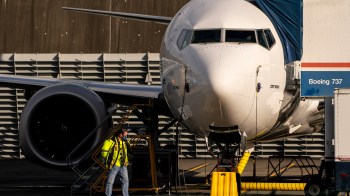Southwest checks planes after safety scare
Bob Moon: The mounting troubles facing Southwest Airlines today are all the more painful for a carrier that prides itself on offering cheap fares which depend on a highly efficient flight schedule.
Southwest commercial: You are now free to move about the country.
Today, Southwest was forced to cancel around 70 more flights — on top of the 600 it scrubbed over the weekend. Maintenance crews are checking planes for hairline cracks like the ones that opened up into a yard-long hole in one of Southwest’s Boeing 737s on Friday. The Federal Aviation Administration is expected to order checks of other 737s across the industry after Boeing recommended it.
The Southwest plane landed safely — nobody was hurt. But now it seems, the stress Southwest puts on its older planes could cause some pain for the company and the way it operates.
Marketplace’s Jennifer Collins reports.
Jennifer Collins: The Southwest plane in question was about 15 years old. Back when the company started buying its kind:
Howard Putnam: It was the creme de la creme.
Howard Putnam was Southwest’s CEO in 1981. He says the company needed a workhorse and found it in the 737-300 series.
Putnam: Our airplanes did more takeoffs and landings. That’s how you make money.
But taking off and landing seven times a day for 15 years is tough, even for the 300 series.
Putnam: As an airplane pressurizes, it expands, and then as you depressurize, it comes back. It’s no different than if you have a piece of aluminum in your hand and you just kept bending it and bending it and bending it.
Eventually, something’s got to give. And now, consultant Robert Ditchey says that something may be Southwest’s plan to add longer flights to destinations like New York and D.C.
Robert Ditchey: The likely scenario is Southwest will not expand or might go through a slight contraction as it retires these older airplanes.
Transportation professor Richard Gritta says in the long run, this means more of the older planes will be grounded more often.
Richard Gritta: Now, there’s ways to handle that. You could buy more aircraft and simply rotate just like you do with the second team in basketball or football.
A second-string, plus pricier oil, means higher fares for the rest of us.
I’m Jennifer Collins for Marketplace.
There’s a lot happening in the world. Through it all, Marketplace is here for you.
You rely on Marketplace to break down the world’s events and tell you how it affects you in a fact-based, approachable way. We rely on your financial support to keep making that possible.
Your donation today powers the independent journalism that you rely on. For just $5/month, you can help sustain Marketplace so we can keep reporting on the things that matter to you.


















